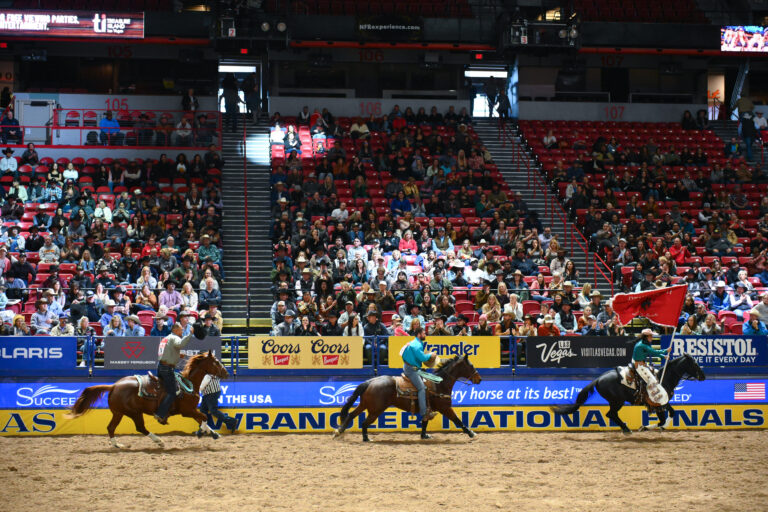There are five returning team roping world champions headed to the 2018 Wrangler National Finals Rodeo: Clay Tryan (2005, 2013 and 2014), Chad Masters (2007 and 2012), Aaron Tsinigine (2015), Erich Rogers (2017) and Cory Petska (2017).
No world championship team exists in the 2018 Wrangler NFR field, with reigning champs Rogers and Petska roping with Clint Summers and Derrick Begay, respectively. The gold buckles are anybody’s for the taking this year, but these five cowboys know what it takes to get their hands on one come Round 10.
The NFR payoff is $10,000,000 again this year, with each event paying out $1.1 million over 10 nights. $253,846.15 is up for grabs in the average alone for both headers and heelers, so what each competitor does in Vegas will determine how they finish the year.
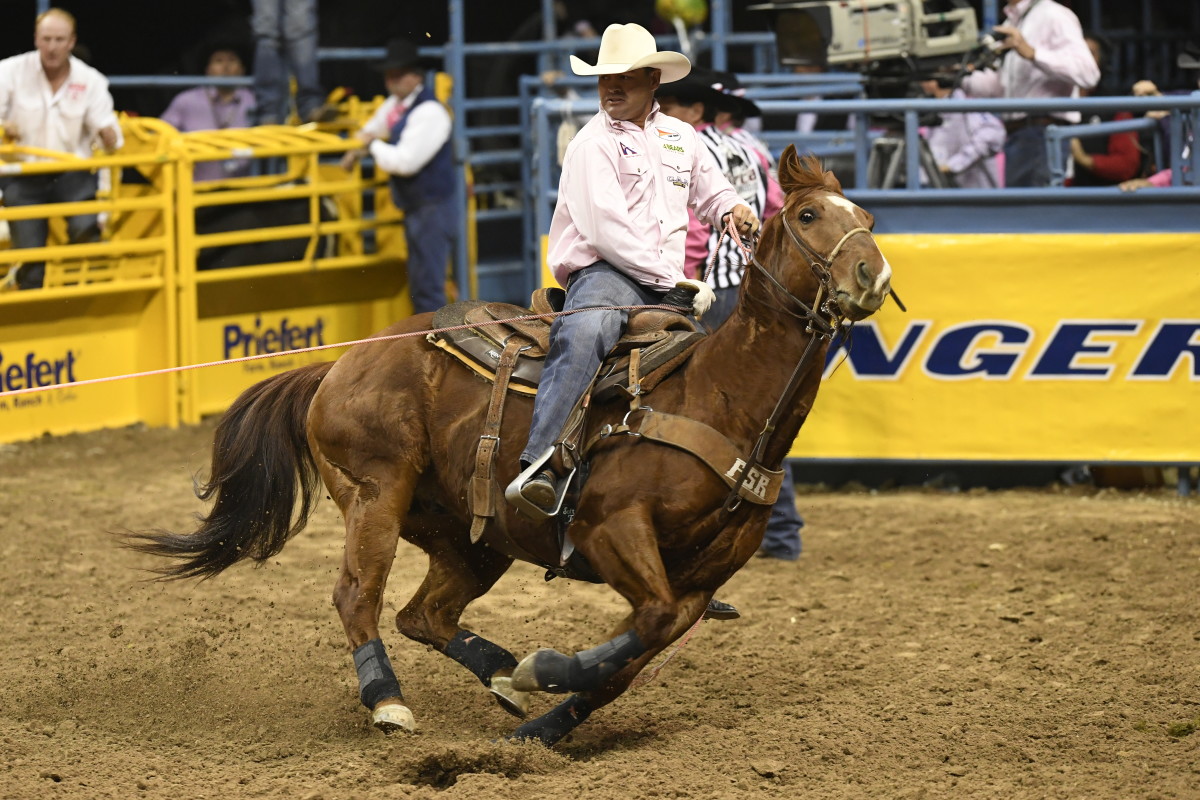
Three-time gold buckle winner Clay Tryan heads to the Finals fourth in the PRCA World Standings with $96,990.03, just one second-place go-round check out of the number-one spot in the world.
Tryan will rope at the 2018 Wrangler NFR with Travis Graves, with whom he roped at the Thomas & Mack in 2010, 2011 and 2012. They’ve twice finished second in the world (2010 and 2011). Tryan has won the average at the Finals twice (2004 and 2014), and Graves is the reigning Wrangler NFR average champ (with Masters in 2017).
Tryan last won the world in 2014 with Jade Corkill during their dominant streak, and the pair also won the ERA World Championship in 2016 when they broke from the PRCA. They split this winter, and Corkill took the year off to spend time with his kids. Corkill roped with Colby Lovell this fall.
“Travis and I never really had a great NFR when we roped before,” Tryan said. “I haven’t really won that many rounds, in general. But I’m not trying to win every one of them. If you’re a guy who always goes in at the bottom, you’ll win more rounds because you’re trying to from the start. Up until 2015 (when the NFR payout jumped so substantially), if you had a lead going in and did decent at the NFR, only a couple teams could beat you. Things have changed so much, you still almost have to win the most money at the Finals. You have to go fast, but you don’t have to win every round. But you do need to win a lot of money, because the team who wins the most money at the end of the year is who wins the gold buckle.”
Tryan plans to start the NFR on Johnson, the 2005 sorrel gelding he’s ridden all season and since 2016. He also plans to have Dew, the bay gelding who won the AQHA/PRCA Head Horse of the Year title in 2015 and carried Tryan to the gold buckle in 2013 and 2014.
“We’ve been practicing a lot, no different than always,” Tryan said. “I rope a lot regardless. To me, nowadays, it’s so competitive and there are so many good headers, if you don’t rope all the time you’ll only be so good. There might be a guy that says that’s not true, but that’s not what I see. Those are the ones who stay good. I didn’t get NFR steers. All of its overrated. You cannot practice the same as the NFR, no matter what. Any kind of practice, being sharp and ready, isn’t overrated. Everybody builds the arenas and says it’s a part of their success. I’ve built arenas and did terrible and not built arenas and done great. The year I had the best NFR, I was living in Arizona and didn’t even turn a steer because I didn’t have a heeler except for two half-day sessions.”
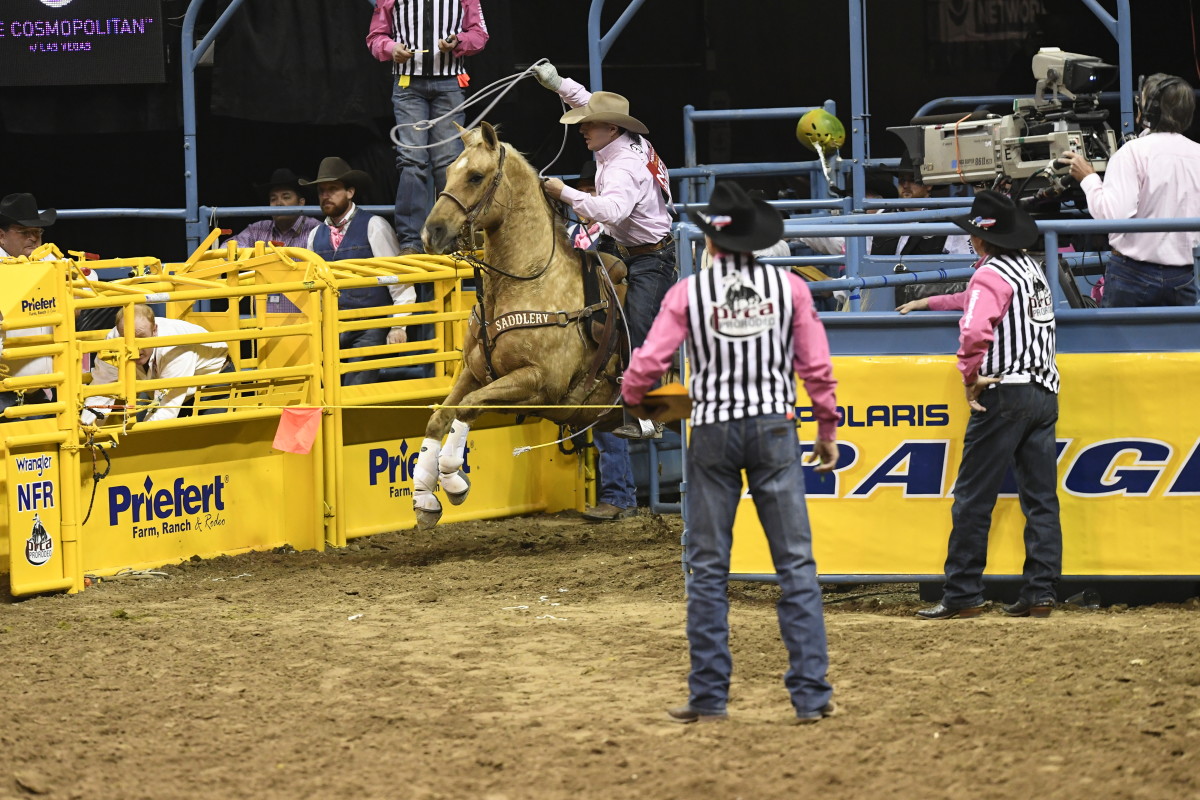
Two-time World Champion Header Chad Masters is seventh in the PRCA World Standings with $85,342.14 won going into the Wrangler NFR. For reference, that’s just $30,000, or a go-round win and placing out of the number-one spot.
Masters comes into this year’s Wrangler NFR on the heels of some big wins during the regular season, including in the two least-NFR-like setups: Pendleton and Cheyenne. He’ll rope with Joseph Harrison, with whom he won The Daddy of ‘Em All in July. Harrison won $82,346 at last year’s NFR—his first appearance in the City of Lights—and will have the horse to outperform the pack.
“I thought Joseph roped awesome last year,” Masters said. “He ropes fast every time and he’s shooting for first every time. He’s going to heel fast. It’s depending on me how much we win or don’t in the day money. If you turn them for money, those are the ones he catches.”
Masters won the average with Travis Graves in 2017, banking $110,269 a man. But Masters is the first to admit that he wasn’t totally satisfied with the way those 10 rounds ended up.
“I was not trying to just catch last year,” Masters said. “I was trying to win. But any time a steer didn’t start, I hit catch mode. Any time that steer went left, I was in catch mode. Any time anything went bad, I was in catch mode. I immediately dumped my game plan of going fast. Whatever my plan was last year, it was too slow. You’d like to step it up, but as soon as you try to step it up, you give yourself a chance to miss. Lucky for me, I ended up catching the last two or three and I did win the average. But if anything had gone wrong, I’d have left Las Vegas with $20,000. That’s not trying enough. I have to step up and try harder than I did last year, but I’m still happy how it turned out. Personally, I’ve tried stepping it up for the last three weeks and, yes, I can go faster, but my catch percentage goes way down. I don’t know if it’s good to be on defense, catch mode, or to try to go faster. I’m hoping to try to get through the first three rounds and know how my cows are going and how much they’re going to start. I’ve practiced enough to step it up. But for me or anyone, when you go faster, your catch percentage goes down.”
Having two gold buckles already in his collection doesn’t make him any more confident or nervous going into the Finals, Masters said.
“I think it made a difference when I was younger. But now it’s been hit and miss for me with my good years. There’s times you feel really confident about having a chance to win another one, and there are other times when you feel like the competition is even tougher. As much as it pays out there, it’s anyone’s ball game as long as you make it there.”
Despite having as many or more great head horses than most guys going up and down the road, Masters will take Jimmy—the yellow 12-year-old gelding he rode in 2017—to Las Vegas this year.
“Confidence at the NFR has got a lot to do with knowing which horse you’re riding and having confidence in him,” Masters said. “It’s the only place I’ve ever been where your first steer is the most important. It would be nice if I could get some good goes. There were years I felt really prepared and it went terrible. And years I’ve been poorly prepared and it went fine. In 2012 I ran 12 steers before the Finals because I hurt my back, but I was confident in my horse, my rope and my partner, and I won the world.”
[Read more: The Science of Score with Chad Masters]
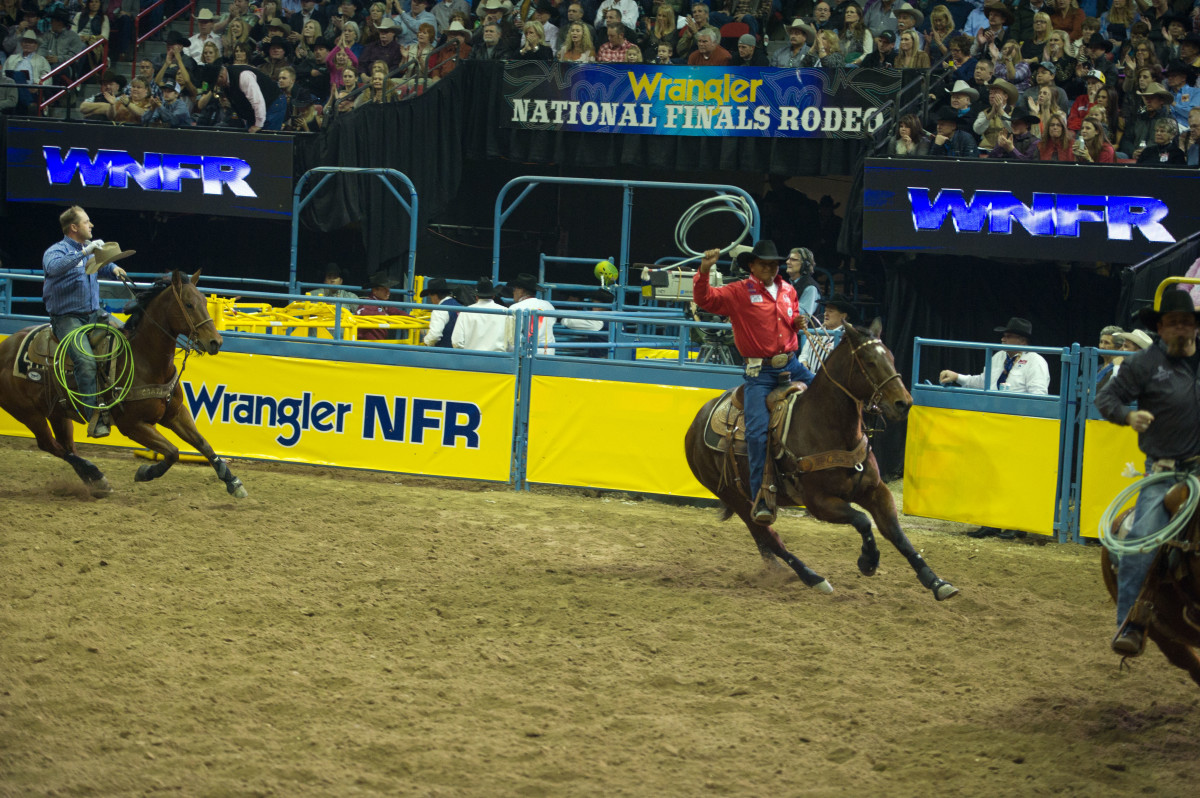
Aaron Tsinigine comes into this year’s Wrangler NFR ninth in the PRCA World Standings with $84,044.49—his first appearance in the storied building for the Finals since he won that gold buckle in 2015.
When Tsinigine won the world in 2015, he came into the Finals with nearly the same amount of money won so far in 2018, but at fifth in the standings. Then, Tsinigine was some $50,000 out of the number-one spot held by Tryan. This year, he’s only $31,300 behind Clay Smith at number-one.
Tsinigine began his 2018 campaign with long-time friend Kyle Lockett, who went home to California after the winter rodeos. Tsinigine then picked up Trey Yates before the BFI, and the two went on a tear that included wins at Reno, Cody, Colorado Springs and more.
Tsinigine made his first Wrangler NFR in 2014 with legend and seven-time world champ Clay O’Brien Cooper, and again in 2015 with NFR-regular Ryan Motes. This year, it will be Tsinigine who will play the veteran in the partnership, with the youngest of the Yates dynasty making his first trip to the NFR in a few days.
“I think Trey roped outstanding this year, and I have confidence in him,” Tsinigine said. “We roped 30 steers yesterday and caught a high percentage. I feel great about it. He has great horses, and that makes it even better. I’m worried about catching 10 steers, that’s my job.”
[Related: Aaron Tsinigine on The Score Podcast]
[Related: Trey and JD Yates on The Score Podcast]
Tsinigine will crack out Smudge, the great, 16-year-old bay gelding aboard whom Tsinigine made a name for himself with a win at the 2013 USTRC Cinch National Finals of Team Roping’s Open and at his first two Wrangler NFRs.
“Right now, I ran one steer on him yesterday and he felt amazing,” Tsinigine said of the horse he and his family have nursed back to health since ringbone surgery in the fall of 2017. “I’m starting out on him unless something happens in the last nine days or so. He’s number-one and old sorrelly will be the backup.”
Tsinigine and Yates are practicing for the Finals together in Arizona for the last week before heading to Vegas, in an NFR arena Tsinigine and friends set up in Fort McDowell. They stocked up on 550–600-pound M-branded Corrientes that run hard.
“I’m more nervous this year than I was my first year there,” Tsinigine said. “I haven’t made it in a few years. When I made it before, I had all the routines in order. This year I thought it would come right back, but I forgot the routines I usually go through. As I go along, I’m remembering them. It feels like I’m going again for the first time.”
But with that said, Tsinigine said he feels like he has nothing to prove to fans or fellow competitors this time around.
“I’ve been there, done it all and I don’t have anything to prove. I know I have to win some money. I am going to try to win as much money as I can and try to be smart at the same time.”
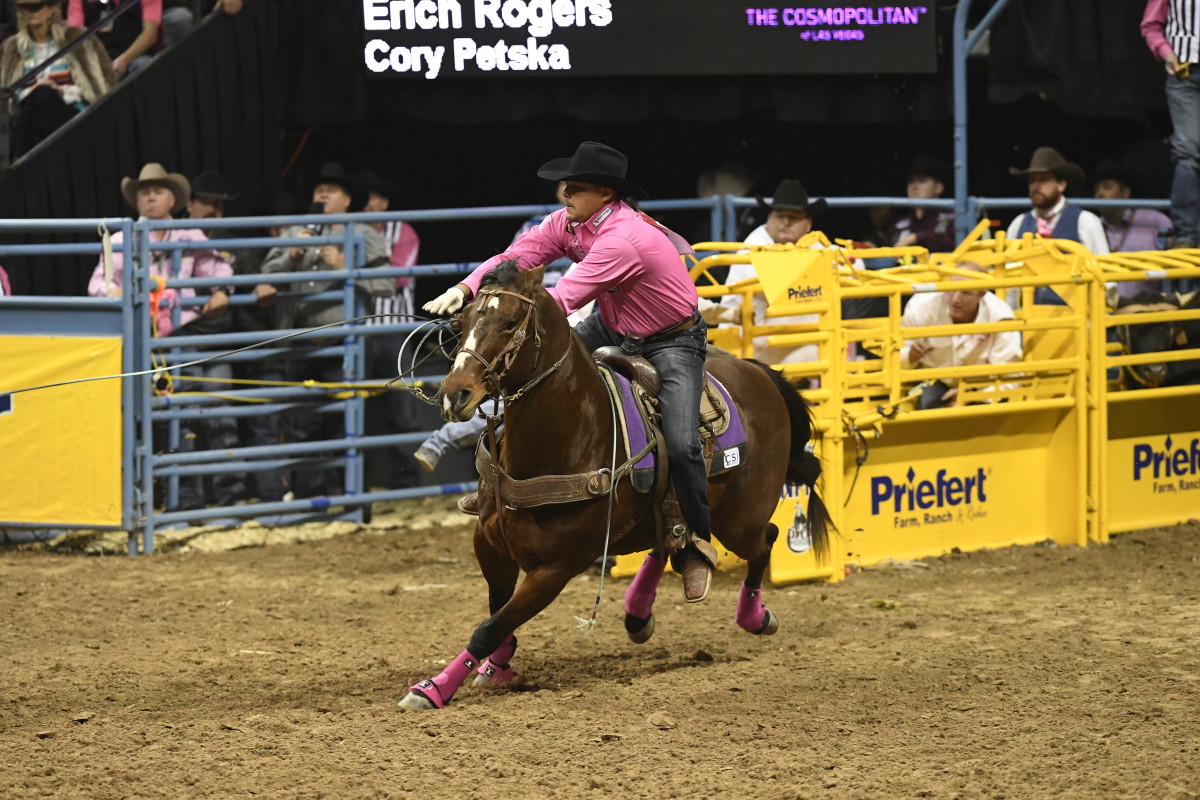
Erich Rogers, who was injured after a bull dogging wreck at the Cinch Timed Event Championship early this spring and sat out most of March, April and May, enters this year’s NFR 13th in the PRCA World Standings with $68,354.22.
Rogers started the year with Petska but roped with young-gun heeler Clint Summers from June through the end of the season, chipping away at the standings to secure their spot at the Finals.
“I got hurt in March, and then it was tough to get back up to where everyone was,” Rogers said. “We switched partners the first of June, and the chemistry wasn’t going right away. Right toward the end of the season we started rolling.”
Rogers will have his dun horse, Boogieman, at the Thomas & Mack this year. He finished the last four rounds in 2017 on the gelding after Dolly (Dustin Bird’s great mare) was sidelined due to injury. Rogers and Petska finished last year’s Wrangler NFR second in the average, roping nine steers in 53.9 seconds.
“I missed one on him last year,” Rogers said. “The steer had a low head that night, and it just went right over the right horn. It wasn’t the horse’s fault at all. He’s the only one I got this year, so he’s it.”
Rogers made six trips to Las Vegas before winning the world title and finishing second in the average in 2017, finishing as high as third in the average with Kory Koontz in his second NFR appearance in 2012. He hasn’t missed a Finals since qualifying for his first in 2011.
“I’m just glad to go to another Finals,” Rogers said. “It’s just a whole new year. No pressure, no nothing. A gold buckle is a gold buckle, and everyone is trying to get another one. So I’m just trying to get another one, too.”
Florida’s Summers has been in Arizona for a few weeks, and the duo has just been making jackpot runs in a full-size arena.
“Because of those small arenas back East, Clint knows the deal,” Rogers said.
[Related: Clint Summers on The Score Podcast]
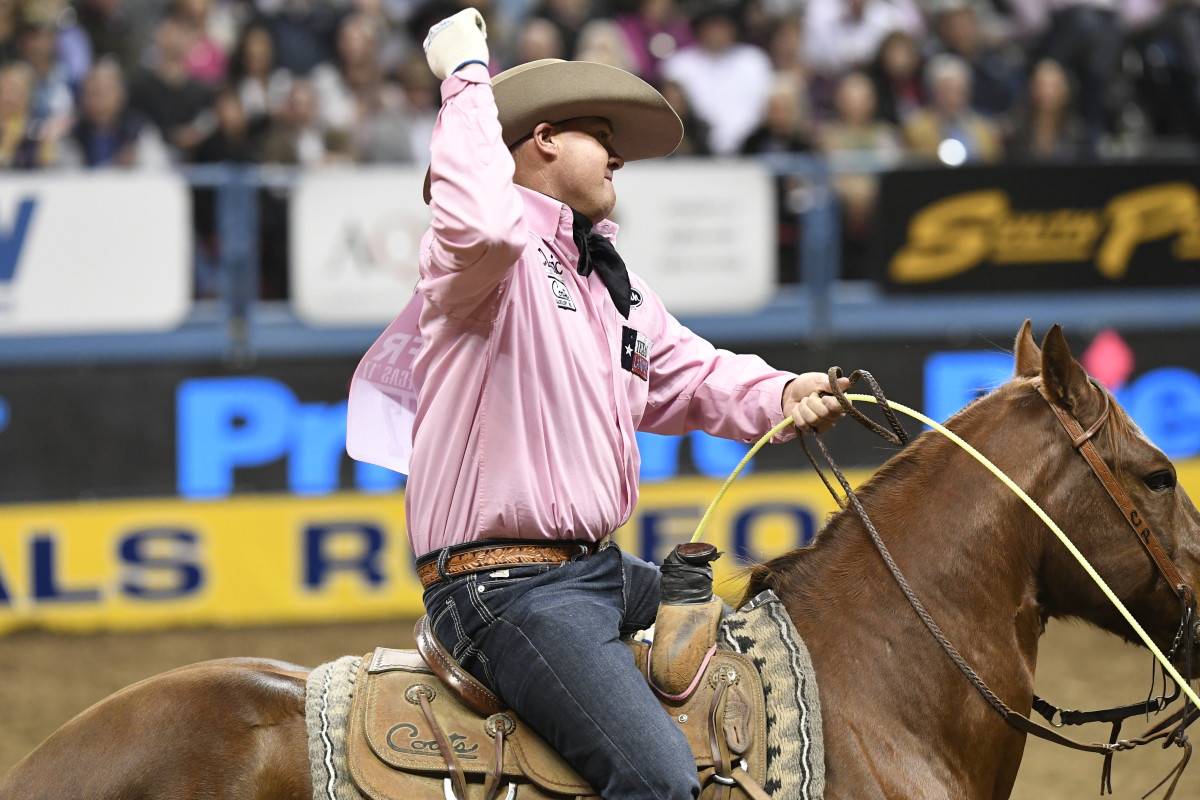
Cory Petska has the only gold buckle on the heel side coming into the 2018 Wrangler NFR, not counting standings-leader Junior Nogueira’s all-around buckle from 2016.
Petska, who has $91,294.03 won on the year, didn’t plan on rodeoing in 2018 and won most of his money in just 18 rodeos with new partner Derrick Begay.
“It doesn’t matter what we do [at the 2018 Wrangler NFR] because we’re both happy to be there,” Petska said. “I bet I went to 50 rodeos, but I bet the $90,000 we won came from 18 rodeos.”
Rogers and Petska split after Petska decided he didn’t want to rodeo much in 2018, instead focusing on the family’s cattle operation in Wisconsin. Rogers found Summers, while Petska picked up Begay starting over the Fourth of July and got on a roll.
“This has been the best year because I won money and I didn’t have to drive,” Petska said. “We hired Dustin DeBusk [who drove for Jim Ross Cooper for years], and there’s nobody better.”
Petska rode WeeMan, a horse owned by Jessi Fish, the first half of 2018 and finished the season on Chumlee, last year’s NFR mount.
“Chumlee is so fast and so cowy,” Petska said of the tie-down-less gelding. “A lot of times you have to go off the nod there, and you’ll be late. But he’ll get you down the arena. And sometimes one like that, that’s so fast there, will get you there and you’ll be on top of them. But he just cows and pulls himself off. He’s just a freak and I thank God he’s my freak.”
Petska’s so confident in Chumlee, he isn’t even planning on taking a backup horse. But he knows his uncle, Monty Joe Petska, has one nearby in California if worse comes to worse.
While Petska and Rogers practiced together day in and day out, Petska and Begay haven’t run a steer together in recent weeks.
“I’ve been in Texas roping with Logan Olson,” Petska said. “Logan came to Arizona and I’ve been roping with him this week. Derrick is coming Thursday, so we’ll have one day of NFR practice.”
This is Petska’s 15th Wrangler NFR, so he’s pretty relaxed about his position going in.
“I actually didn’t even know I was the only heeler going back with a gold buckle until my wife mentioned it this morning. It doesn’t add any pressure or take any away. We’re going to have fun and see how it goes this year. It’s just a clean slate. And you want to do as good as you can. If you go in there thinking you won a gold buckle last year so it will be easier this year, you’ll have an even worse NFR.” TRJ







